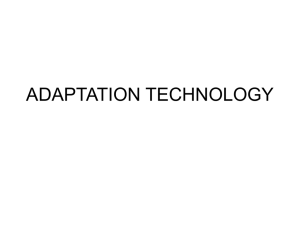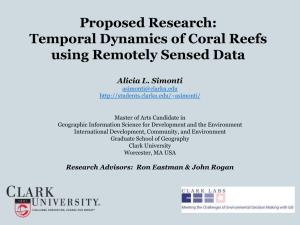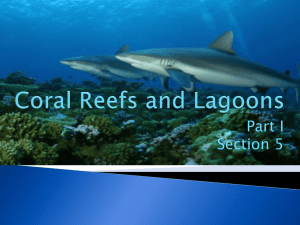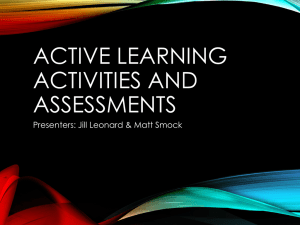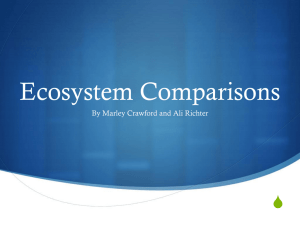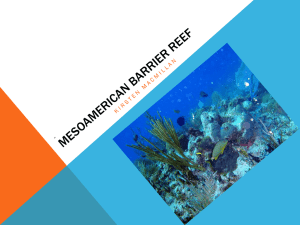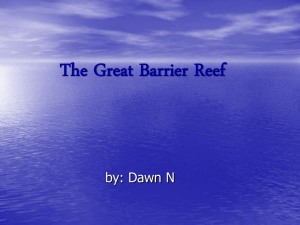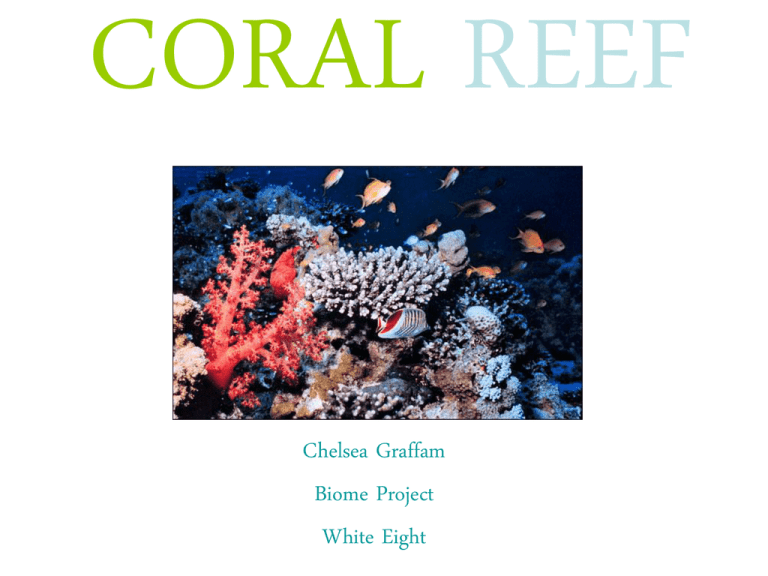
CORAL REEF
Chelsea Graffam
Biome Project
White Eight
What is a coral reef?
Coral Reef, coastal and oceanic
ecosystem renowned for its beautiful
life forms and for providing one of the
most biologically diverse habitats on
Earth. A reef is a ridge or outcrop of
rock in the sea that comes close to the
surface. A coral reef is a reef that has
been built largely or entirely by corals,
tiny animals that live together in
colonies. Over hundreds or thousands
of years the limestone skeletons of
coral build up, with new corals
growing on the skeletons of the dead
ones. This physical structure, with its
living surface of corals and other
organisms, is a coral reef. Coral reefs
support greater numbers of fish and
invertebrate species than any other
ecosystem in the ocean.
http://upload.wikimedia.org/wikipedia/commons/7/76/Blue_Linckia_Starfish.JPG
Coral Reef
http://www.epa.gov/bioiweb1/images/
coral_reef13_Img_3920.jpg
http://earthobservatory.nasa.gov/Study/Paleoclimatology_CloseUp/Images/c
oral_reef.jpg
Coral Reefs Information
“Coral reefs are warm, clear, shallow ocean habitats that are rich
in life. The reef's massive structure is formed from coral polyps,
tiny animals that live in colonies; when coral polyps die, they
leave behind a hard, stony, branching structure made of
limestone. The coral provides shelter for many animals in this
complex habitat, including sponges, fish (like Blacktip Reef
Sharks, groupers, clown fish, eels, parrotfish, snapper, and
scorpion fish), jellyfish, anemones, sea stars (including the
destructive Crown of Thorns), crustaceans (like crabs, shrimp,
and lobsters), turtles, sea snakes, snails, and mollusks (like
octopuses, nautilus, and clams).”
The Beautiful Coral Reef
http://upload.wikimedia.org/wikipedia/commons/3/32/Nwhi__French_Frigate_Shoals_reef__many_fish.jpg
What is the climate like?
The corals that build reefs are found
only in warm tropical waters where sea
temperatures rarely fall below 18°C
(64°F). They thrive only in clear
saltwater where bright sunlight can
penetrate. This is because corals
cannot exist without symbiotic algae,
that lives in coral tissues and require
sunlight for photosynthesis. Coral reefs
are found in both temperate and
tropical waters. The average
temperature of a coral reef is around
26°C. There are coral reefs in the
Persian Gulf that 13°C in the winter
and 38°C in the summer.
http://www.solcomhouse.com/coralreef.htm
Where are Coral Reef’s Located?
Coral reefs can be found between 30
degrees north and south latitude, the
greatest concentration is found
between 4 degrees north and south
latitude in the western portions of all
major oceans. The are commonly
located off the coast of continents.
There are two broad categories of
coral reefs: shelf reefs and oceanic
reefs. Shelf reefs include fringing
reefs, platform reefs, bank reefs, and
barrier reefs and are located on the
continental shelf, while oceanic reefs
are found off the continental shelf
growing around the margins of
volcanic islands.
http://en.wikipedia.org/wiki/Coral_reefs
http://www.enchantedlearning.com/biomes/coralreef/coralreef.shtml
Dominant Animals In Coral Reef
http://www.ucmp.berkeley.edu/exhibits/biomes/marine.php#reefs
The dominant species in the coral reef
is mainly coral. Everything in the coral
reef revolves around coral. Other
dominant species in the coral reef are
fish, sea urchins, octopuses, and sea
stars.
Sea Star on Coral
http://www.adamaqua.com/photo/05_coral_reef_scene.jpg
Types of Vegetation
Coralline Algae
http://images.encarta.msn.com/xrefmedia/share
med/targets/images/pho/t012/T012724A.jpg
Seaweed
Mangroves
http://www.earlham.edu/~
merwije/webs/EC.htm
http://www.geocities.com/wenr
aylm/seaweed.jpeg
Seagrass
http://www.chucksaddiction.com
/seagrass.jpg
Negative Effects Humans Have
on the Coral Reef Biome
Human activity may represent the greatest threat to coral reefs living in
Earth's oceans. In particular, global warming, coral mining, pollution
over-fishing, and the digging of canals and access ways into islands and
bays are the most serious threats to these ecosystems. Also, physical
destruction by building untop of the reefs itself (due to lack of space),
destruction of mangrove and seagrass beds and other destruction caused
by boat and shipping traffic is a problem.
Positive Effects Humans Have on the Coral Reef
Biome
Since many researchers have learned that many
coral reefs are being destroyed, some people are
trying to save the coral reefs. Foundations have
set up certain protected areas, so that they
cannot be destroyed. This is a positive thing
that humans have done to try and help coral
reefs survive.
Bibliography
•
•
•
•
•
•
•
•
•
Spalding, Mark D. "Coral Reef." Microsoft® Student 2007 [DVD]. Redmond, WA: Microsoft Corporation, 2006.
Johnson, Sylvia A. (1984) Coral Reefs. Lerner Publications.
DuTemple, Lesley A. (2000) Coral Reefs. San Diego, California: Lucent Books, Inc.
"Coral Reef," Microsoft® Encarta® Online Encyclopedia 2008
http://encarta.msn.com © 1997-2008 Microsoft Corporation. All Rights Reserved.
"Coral Reef." Wikipedia. 28 Oct. 2008 <http://en.wikipedia.org/wiki/coral_reefs>.
"Coral Reef." Enchanted Learning. 09 Nov. 2008 <http://www.enchantedlearning.com/biomes/coralreef/coralreef.shtml>.
"Coral Reef." Wikipedia. 28 Oct. 2008 <http://en.wikipedia.org/wiki/coral_reefs>.
"Coral Reefs: Plants & Animals Facts." Reef. 28 Oct. 2008
<http://www.reef.crc.org.au/discover/plantsanimals/facts_plantanimal.htm>.
"The Marine Biome: Coral Reefs." UCMP Berkeley. 13 Nov. 2008
<http://www.ucmp.berkeley.edu/exhibits/biomes/marine.php#reefs>


